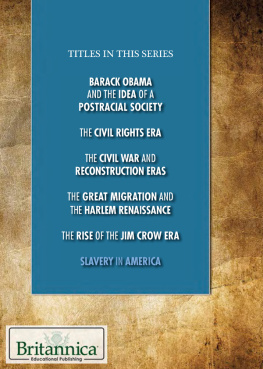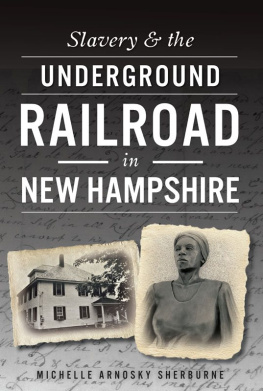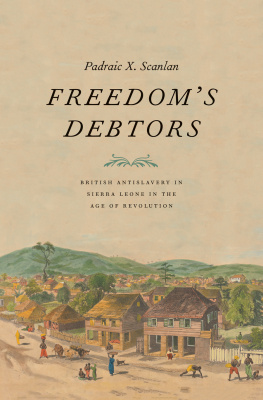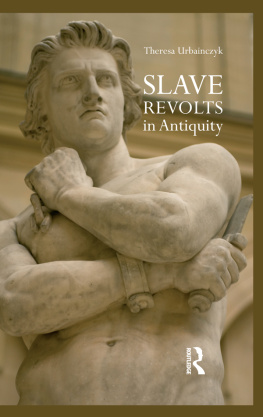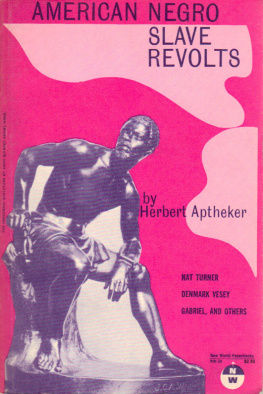Antislavery, Abolition, and the Atlantic World
R. J. M. Blackett and James Brewer Stewart, Editors
CARIBBEAN
SLAVE REVOLTS
AND THE
BRITISH
abolitionist
movement
GELIEN MATTHEWS

Published by Louisiana State University Press
Copyright 2006 by Louisiana State University Press
All rights reserved
Manufactured in the United States of America
First printing
Designer: Michelle A. Garrod
Typefaces: Sabon, Democratica
Typesetter: The Composing Room of Michigan, Inc.
Printer and binder: Edwards Brothers, Inc.
Library of Congress Cataloging-in-Publication Data
Matthews, Gelien, 1965
Caribbean slave revolts and the British abolitionist movement / Gelien Matthews.
p. cm.
Includes bibliographical references.
ISBN 0-8071-3131-8 (cloth : alk. paper)
1. SlaveryCaribbean AreaHistory. 2. Slave insurrectionsCaribbean AreaHistory. 3. Antislavery movementsGreat BritainHistory. I. Title.
HT1071.M38 2006
306.36209729dc22
2005023669
The paper in this book meets the guidelines for permanence and durability of the Committee on Production Guidelines for Book Longevity of the Council on Library Resources. 
This study is dedicated to Aisha, Tewana, Coreisha, Abiola, Sabrina, Orlanda, Avril, Kizzy, and also Fana Zulu, 19971999 5C students of the Success Laventille Composite School of the Republic of Trinidad and Tobago.
CONTENTS
PREFACE
Caribbean Slave Revolts and the British Abolitionist Movement studies the British antislavery movement and the major nineteenth-century slave revolts in the English colonies, particularly those in Barbados (1816), Demerara (1823), and Jamaica (18311832). It examines the links that abolitionist discourse established between British antislavery and slave revolts in the colonies. A study of this nature bears on the long-standing historical debate concerning the primacy of various agencies in achieving slave emancipation. Although this book focuses on British abolitionists commentary on West Indian slave revolts, it does not seek to overthrow other explanations that historians have advanced to explain abolition. Factors such as the growth of public support and agitation in Britain against slavery; political reform in the British Parliament; the planters recalcitrance about slavery amelioration; persecution of sectarian missionaries in the colonies; the financial difficulties facing the West Indian planters as a result of duties paid on sugar exported to Britain; hurricanes in the colonies and soil exhaustion, among other hardships; as well as the culminating effects of slave revolts all contributed to the dismantling of the servile regime. Principles of humanity, justice, and Christianity, as well as economic, political, and social developments in Britain and in the colonies impacted the attack on British West Indian slavery. However, while these factors feature prominently in discussions of British abolitionism, the slave-revolt theme is conspicuously absent. This book rescues slave rebellion from its obscurity in historical accounts of the British antislavery struggle. It seeks to broaden the circumference of the British antislavery argument without claiming that slave rebellion was more important than any other dimension. Consequently, the book fills a gap left in mainstream narratives on the history of antislavery in Britain by demonstrating that slaves in rebellion commandeered humanitarian attention. Rebels led abolitionists to carve out a narrative best defined as the slave rebellion discourse of British abolitionism. The experiences of the colonized on one side of the Atlantic shaped a significant strand of the discourse of the colonizers on the other side. The most depressed subjects in the slave plantation colonies provided distinguished metropolitan spokesmen with a discourse, which, while hidden from history, ought to be regarded as a dynamic episode in the making of the Atlantic world.
Although there exists no other full-scale treatment of the impact of slave rising in the West Indies on the discourse of abolitionists thought in Britain, this study is comparable to Hogendorn and Lovejoys treatment of the end of slavery in Northern Nigeria.
ACKNOWLEDGMENTS
First, I must express my deepest gratitude to my supervisor at the University of Hull, Professor David Richardson. I deeply appreciate his unfailing concern for my well-being, his support of every academic adventure I embarked on during my three years at Hull, his patient, candid, and useful criticism, and his astute suggestions for surmounting the challenges that I faced as a research student. I am also grateful for the meticulous scrutiny with which Professor David Eltis, Queens University of Canada, perused early drafts of these chapters. To the ever efficient Gill Craig and the very pleasant and helpful Vikki Magee at Hull, I say thank you.
I am indebted to the University of Hull for the Black Diaspora Scholarship and to the School of Economics, University of Hull, which also contributed to my financial support. I say thanks to the trustees of the Phillip Reckitt Trust Fund for sponsoring part of my research trip to Barbados, Jamaica, and Guyana in 2000 and to the directors of Arnold Matthew Publications, who also contributed generously to that trip. My gratitude goes to the David Nicholls Memorial Trust Fund for making it possible for me to conduct research at the Bodleian Library in Oxford and the Angus Library at Regents College, Oxford. I am thankful to Dr. Diana Paton, Mrs. Marjorie Davis, and others at the Society for Caribbean Studies for two bursaries that enabled me to attend and present papers at their seminars and conferences in 2000 and 2001.
To the many families who accommodated me in their homes during my research trips, thank you very much. These families are Margaret and Owen Minnot of Hope Pastures, Jamaica; Margaret and Anthony Christy of St. Phillip, Barbados; Janice and John Woolford of Demerara, Guyana; Dr. Christine Ayorinde of Jack Straw Lane, Oxford, England; and Chris Essilfie of Hillsborough Court, London, England.
I am especially thankful to Professor Bridget Brereton of the University of the West Indies, St. Augustine Campus, who first believed in my ability to make some useful contribution to this body of scholarship and who took the first steps in making my studies at Hull a reality. And, of course, I must say thanks to God Almighty, the one who orchestrates from the beginning to the end my every endeavor. I give him the highest praise for the favor he has bestowed on me.
CARIBBEAN SLAVE REVOLTS
AND THE BRITISH ABOLITIONIST MOVEMENT
1
INTRODUCTION
This book analyzes four aspects of the British antislavery discourse on the slave rebellions that erupted in the British West Indies in the first three decades of the nineteenth century. Chapter 2 focuses on the abolitionists denial that antislavery agitation prompted slave revolts and their attempts to understand revolt from the slaves perspectives. Chapter 3 discusses how British abolitionists interpreted and described the suppression of these revolts, portraying slaves as both victims of slavery and agents of antislavery. Chapter 4 shows how abolitionists validated slave rebels as instruments advancing the antislavery campaign, for the slaves suffering following crushed rebellions revealed some of the corruption of colonial society. Finally, chapter 5 shows how abolitionists presented continual servile warfare as a threat to the survival of the plantation empire and how they used slave revolts as a rationale for extensive imperial intervention in a slave colonial system that made revolt almost inevitable.
Next page

